Stroke in Children
Medically reviewed by Drugs.com. Last updated on Apr 2, 2024.
What is a stroke?
A stroke happens when blood flow to part of the brain is interrupted. This can cause serious brain damage from a lack of oxygen. Brain function may be affected depending on where the stroke happens. A stroke can happen when your child is still in the womb, or at any age after birth. A stroke caused by a blood clot is called an ischemic stroke. A stroke caused by a burst or torn blood vessel is called a hemorrhagic stroke. Signs and symptoms of a stroke will depend on where in the brain it occurred. Signs and symptoms usually appear suddenly. A stroke is a medical emergency that needs immediate treatment.
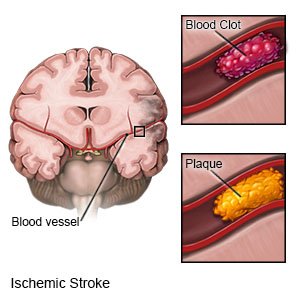 |
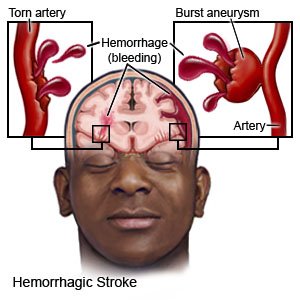 |
What are the warning signs of a stroke?
The words BE FAST can help you remember and recognize warning signs of a stroke:
- B = Balance: Sudden loss of balance
- E = Eyes: Loss of vision in one or both eyes
- F = Face: Face droops on one side
- A = Arms: Arm drops when both arms are raised
- S = Speech: Speech is slurred or sounds different
- T = Time: Time to get help immediately
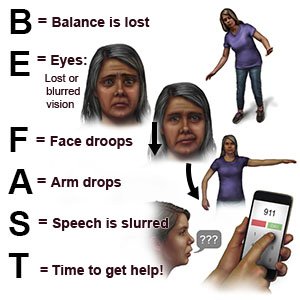 |
What are the signs and symptoms of a stroke in newborns and infants?
- Seizures
- Trouble eating
- Trouble breathing or pauses in breathing
- Paralysis on one side of the body, or only using one arm
- Developmental delays, such as crawling later than usual
What are the signs and symptoms of a stroke in older children and teenagers?
Any of the following can develop at the time of a stroke, or years later:
- Seizures
- Being less awake than usual or loss of consciousness
- Loss of vision in one or both eyes
- Headache with or without vomiting
- Sudden weakness in an arm or leg, or trouble walking
- Sudden changes in mood or behavior
- Trouble speaking or swallowing
- Blurred or double vision
- Trouble completing schoolwork
What increases my child's risk for a stroke?
- Not enough oxygen during labor or birth
- A heart problem at birth, or a heart problem that develops after birth
- Sickle cell anemia, Fabry disease, or leukemia
- A medical condition that affects brain arteries
- A vascular disease, blood clotting disorder, or brain tumor
- Dehydration, infection, or head trauma
- High blood pressure, diabetes, or high cholesterol in older children
- An infection in the amniotic fluid during pregnancy, or membranes in the womb ruptured prematurely
- His or her mother had preeclampsia (high blood pressure during pregnancy), diabetes, or abused drugs during pregnancy
How is a stroke diagnosed?
Tell your child's healthcare provider about your child's medical conditions. Also tell the provider about any family history of a medical condition, such as a bleeding or clotting disorder, or diabetes. Your child may need any of the following:
- Blood tests may be used to check how well your child's blood clots or to check for infection. Blood tests may also be used to check for diabetes. Diabetes can increase the risk for a stroke.
- CT or MRI pictures may be used to find the area of the brain that was affected by the stroke. The pictures may also show bleeding in your child's brain. Do not let your child enter the MRI room with anything metal. Metal can cause serious injury. Tell the healthcare provider if your child has any metal in or on his or her body.
- Arteriography is a test that uses a type of x-ray. Pictures are taken of your child's arteries to look for blood flow blockage or bleeding. Contrast liquid may be injected into your child's arteries to help the arteries show up better in the pictures. Tell the healthcare provider if your child has ever had an allergic reaction to contrast liquid.
How is a stroke treated?
Treatment depends on your child's age and the type of stroke he or she had. Treatment will also depend on what has caused the stroke. Any condition that may have caused the stroke will be treated. Your child may need extra oxygen or liquids. He or she may also be given vitamin K to help with blood clotting. Your child may also need any of the following:
- Medicines may be given to break up clots or help your child's blood clot more easily. Your child may also need medicine to control seizures or anemia (low red blood cell count). If your child has hyperglycemia (high blood sugar), he or she will be given medicine to lower the level. Medicine may also be given to raise or lower your child's temperature.
- Thrombolysis is a procedure used to break apart clots in an artery in the brain. A catheter is guided into the artery until it is near the clot. Medicine is put through the catheter that will help break apart the clot.
- Surgery may be used to remove a blood clot or collection of blood, or to relieve pressure within your child's brain. Your child may also need surgery to place a clip to stop blood flow into an artery in his or her brain.
What can I do to care for my child after a stroke?
- Take your child to stroke rehabilitation (rehab) if directed. Rehab is a program run by specialists who will help your child recover abilities he or she may have lost. Specialists include physical, occupational, and speech therapists. Physical therapists help your child gain strength or keep his or her balance. Occupational therapists teach your child new ways to do daily activities. Your child's therapy may include movements for everyday activities. A speech therapist helps your child improve the ability to talk and swallow.
- Make your child's home safe. Your child may have trouble walking or keeping his or her balance after a stroke. Remove anything your child might trip over. Tape electrical cords down. Keep paths clear throughout your home. Make sure your home is well lighted. Put nonslip materials on surfaces that might be slippery. An example is your bathtub or shower floor.
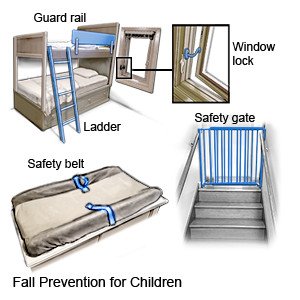
- Help your child use assistive devices. Your child may need to use a walker or a cane. He or she may also need devices to help with daily activities.
How can I help prevent a stroke in my child?
Help your child create healthy habits to continue as an adult. This can help prevent risk factors that may lead to a stroke. After a stroke, your child is at increased risk for another stroke. It is important to help your child lower his or her risk as much as possible. Your child's healthcare provider can tell you more about the following:
- Manage your child's health conditions. A condition such as diabetes can increase your child's risk for a stroke. Control your child's blood sugar level if he or she has hyperglycemia or diabetes. Make sure your child takes his or her prescribed medicines and checks blood sugar levels as directed.
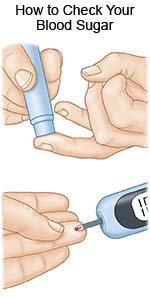
- Check your child's blood pressure if directed. High blood pressure can increase the risk for a stroke. If your child has high blood pressure, follow directions for controlling it.
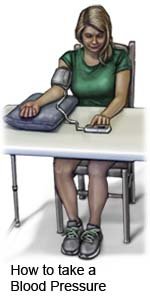
- Offer your child a variety of healthy foods. Healthy foods include whole-grain breads, low-fat dairy products, beans, lean meats, and fish. Your child should eat at least 5 servings of fruits and vegetables each day. Offer foods that are low in fat, cholesterol, salt, and sugar. Choose foods that are high in potassium, such as potatoes and bananas. A dietitian can help you create healthy meal plans.

- Have your child exercise as directed. Activity is important for preventing a stroke. Exercise also helps control blood pressure and weight. Children and teenagers should get at least 60 minutes of physical activity each day. It may help to make exercise a family activity. Find an activity or exercise your child enjoys.

- Help your child maintain a healthy weight. Ask your healthcare provider what a healthy weight is for your child. Ask the provider to help you create a weight loss plan, if needed. Providers can help you and your child break weight loss into small goals if your child has a lot of weight to lose.
- Talk to your teenager about not smoking. Nicotine and other chemicals in cigarettes and cigars can increase the risk for a stroke. Ask healthcare providers for information if your teen currently smokes and needs help to quit. E-cigarettes or smokeless tobacco still contain nicotine. Talk to providers before he or she uses these products.
Where can I find support and more information?
- American Stroke Association
Phone: 1- 888 - 478-7653
Web Address: http://www.stroke.org
Call your local emergency number (911 in the US) for any of the following:
- Your child has any of the following signs of a stroke:
- Numbness or drooping on one side of the face
- Weakness in an arm or leg
- Confusion or difficulty speaking
- Dizziness, a severe headache, or vision loss
-

- Your child has a seizure.
- Your child feels lightheaded, short of breath, and has chest pain.
- Your child coughs up blood.
When should I seek immediate care?
- Your child's arm or leg is warm, tender, and painful. It may look swollen and red.
- Your child has vision loss or a severe headache.
- Your child has trouble having a bowel movement or urinating.
When should I call my child's doctor?
- You have questions or concerns about your child's condition or care.
Care Agreement
You have the right to help plan your child's care. Learn about your child's health condition and how it may be treated. Discuss treatment options with your child's healthcare providers to decide what care you want for your child. The above information is an educational aid only. It is not intended as medical advice for individual conditions or treatments. Talk to your doctor, nurse or pharmacist before following any medical regimen to see if it is safe and effective for you.© Copyright Merative 2024 Information is for End User's use only and may not be sold, redistributed or otherwise used for commercial purposes.
Learn more about Stroke
- Atorvastatin (Lipitor): Top 12 Drug Facts You Need to Know
- Should you mix muscle relaxants with alcohol?
Treatment options
- Medications for Cerebral Thrombosis/Embolism
- Medications for Cerebrovascular Insufficiency
- Medications for Hemorrhagic Stroke
- Medications for Ischemic Stroke
Care guides
Symptoms and treatments
Further information
Always consult your healthcare provider to ensure the information displayed on this page applies to your personal circumstances.
